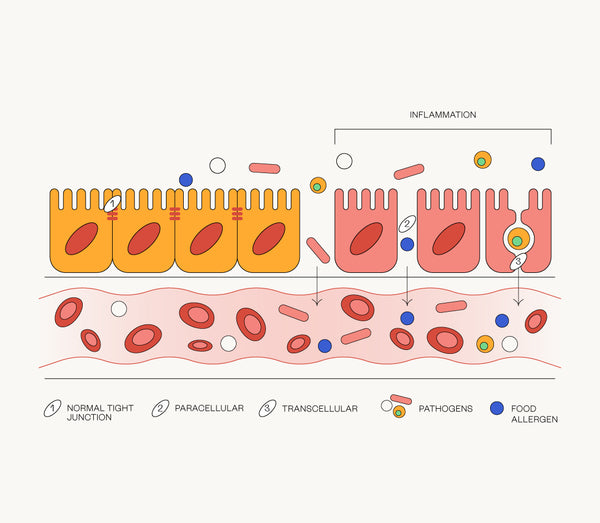A leaky gut isn’t an uncommon phenomenon. To some degree we all have a leaky gut. A bit of a leak here or there isn’t going to do much harm but what if that leak is too much? In this article, we’re going to deep dive into leaky gut, what it is, what causes it, and what you can do to prevent your gut becoming like a sieve.
What is Leaky Gut Syndrome?
Leaky gut syndrome is also known as intestinal permeability and isn’t recognised in the mainstream medical world as a real health condition. According to the NHS, leaky gut is a “proposed condition that some health practitioners claim is the cause of a wide-range of long-term conditions” [1].
But what exactly is leaky gut? Well, the gut actually needs to be slightly permeable to allow nutrients to get through and into the bloodstream. It’s lined with thousands of cells that make up a single layer called the mucosal barrier - that’s the barrier between the gut and the rest of the body [1].
When the barrier works properly, it forms tight junctions that are responsible for allowing some things through like nutrients but prevents large molecules, like toxins and pathogens, from entering the body. You can think of the tight junctions like nightclub bouncers - they let things in that are going to have a good time but keep the rowdy ones that might cause harm out.
If the gut lining becomes unhealthy, these tight junctions can become large holes or cracks, allowing undigested food particles, toxins, and pathogens to pass into the blood and travel around the body. Once inside the body, they can wreak havoc causing nasty reactions, infections, and inflammation [2].
A leaky gut can also result in changes to the gut microbiome and this, coupled with inflammation, can lead to numerous digestive issues. In fact, there is a lot of research which suggests changes to the intestinal environment and inflammation could be significant in the development of many chronic diseases.

What Are The Symptoms and Signs of Leaky Gut Syndrome?
The concept of leaky gut syndrome is growing in popularity and there is plenty of research available showing that there is increased leakiness in people who have inflammatory gut conditions.
Some of the conditions leaky gut has been associated with include:
- acne
- asthma
- autoimmune conditions
- chronic fatigue syndrome
- Coeliac disease
- fibromyalgia
- obesity
- mental illness [3, 4, 5]
Yet, even though these links have been identified, intestinal permeability is still classified as a symptom of these conditions and not a cause. And so, the symptoms of a leaky gut can vary depending on its underlying cause. Some common symptoms of leaky gut syndrome are:
- abdominal pain
- diarrhoea
- constipation fatigue
- bloating
- gas
- weight loss
- vomiting
- cramps
- mucous in stools
- bloody stools
How is Leaky Gut Caused?
There’s still a long way to go into leaky gut syndrome research. It’s not as clear cut as it sounds. Think of it like one of your Nan’s old pin cushions. The more she uses it the more holes it has and the less effective it becomes. But the question is, does it lose its effectiveness because it keeps being poked with needles (symptoms) or because the fabric wasn’t great in the first place (underlying cause).
And that’s where the magnificent world of science is at with leaky gut, is it a cause or a symptom of disease? At the moment, there is evidence that points towards leaky gut being a precursor if not a cause of some chronic diseases, like lupus and type 1 diabetes [6].
Interestingly, there are certain aspects of your lifestyle that can increase the likelihood of intestinal permeability, and you might just be surprised to hear what they are.
- Snacking - After eating your tight junction proteins relax a little to allow much needed nutrients to enter the body. It’s a natural phenomenon which corrects itself after a few hours. However, if you’re a frequent snacker then your tight junction proteins may not close properly which, in turn, leaves your gut in a state of low-grade inflammation.
- Late night eating - research shows that late-night eating is linked to physiological dysregulation, disruption of circadian rhythm, and microbial dysbiosis [10].
The Gut Microbiome and Leaky Gut Syndrome
Of course the gut microbiome would feature in here somewhere, right? That’s right, your gut microbiome plays a fundamental part in your overall health. Generally speaking, a diverse gut microbiome means a healthy gut and a healthy you [7]. Gut microbes are significant factors in the integrity of the intestinal barrier. There are certain bacterial species which are fundamental for strengthening it, such as Akkermansia muciniphila.
It is considered a next generation gut microbe because it could provide benefits for:
- glucose metabolism
- lipid (fat) metabolism
- intestinal immunity [8]
That’s not all A. muciniphila is also understood to help strengthen the gut barrier. It’s name comes from the person who discovered it, an ecologist called Akkermans, and it’s love of mucin (muciniphila). That’s right, the microbe loves to eat the mucus layer that lines the wall of your gut, trust us it’s not a bad thing.
By chewing on the mucus, A. muciniphila produces short chain fatty acids (SCFAs) like acetate which is used by other beneficial microbes to make butyrate. Bingo! Butyrate is the main source of fuel for the cells that line your gut called colonocytes [Need a refresh? Check this out].
By feasting on your gut’s mucus layer, Akkermansia isn’t causing harm but actually doing good. That’s because it encourages the gut cells to produce more mucin which strengthens the barrier and helps to stave off a leaky gut [9]!
What is The Best Way To Resolve Symptoms of Leaky Gut Syndrome?
There are things you can do to help a leaky gut, most of which mean making subtle changes to your lifestyle. Remember, leaky gut isn’t an official medical diagnosis, so there is no suggested treatment. Instead, you’ll need to take steps to take a proactive role in your gut health (and with Innate Co. by your side, it’s easy).
First things first, you need a diverse gut microbiome and the best way to achieve that is to eat a diet rich in foods that promote the growth of good gut bacteria. THINK: plant based foods, lots of colour, little sugar, fat, and processing.

Great foods for great guts
- Brussels sprouts
- Broccoli
- Carrots
- Chard
- Spinach
- Mushrooms
- Squash
- Sweet potatoes
- Turnips
- Kefir
- Kimchi
- Miso
- Sauerkraut
- Tempeh
- Yogurt
- Bananas
- Blueberries
- Kiwi
- Pineapple
- Passionfruit
- Oranges
- Raspberries
- Almonds
- Cashew nuts
- Chia seeds
- Flax seeds
- Peanuts
- Sunflower seeds
Other things you can do to help boost your gut include:
- Exercise
- Limit your exposure to stress
- Stop smoking
- Limit alcohol intake
Innate Co. and Leaky Gut
If you’re looking for innovative ways to proactively support your gut health, then let Innate Co. help. Our Daily Synbiotic has been carefully formulated with your gut in mind. It aims to:
- promote the growth of the beneficial bacteria in your gut
- restrict the growth of bad bacteria or pathogens in the gut
- support several key areas of gut health
We like to call it Microscopic Magic! Our blend of 9 scientifically backed live cultures and a sugar free prebiotic has been configured to help restore the balance in your gut microbiome. Together, with a healthy, fibre-packed diet, regular exercise and other lifestyle boosting behaviours, Innate Co. can help to keep your gut in ship-shape condition.
If you want to know more or are ready to order yours, click here
Summary
Leaky gut is also known as intestinal permeability and is where the lining of the gut becomes weak, allowing pathogens and toxins to pass into the bloodstream. Ultimately, this results in inflammation.
Although it isn’t currently recognised as a medical condition, there is research which helps to prove that leaky gut is real. Many people who have digestive conditions also have a leaky gut, but there is a lack of certainty as to whether it is a symptom or a cause of these issues.
It is possible to reduce your risk of leaky gut syndrome by improving your overall health and lifestyle. By modifying your diet and lifestyle behaviours, you can promote the health of your gut microbiome, inducing a positive effect on your whole body health. Oh, and don’t forget a little microscopic magic from Innate Co., too.
Sources
[1] National Health Service. Leaky gut syndrome. Available at: https://www.nhs.uk/conditions/leaky-gut-syndrome/ [accessed 23 September 2021] (2018)
[2] Campos, M. Leaky Gut: What is it, and what does it mean for you? Available at: https://www.health.harvard.edu/blog/leaky-gut-what-is-it-and-what-does-it-mean-for-you-2017092212451 [accessed 23 September 2021] (2019)
[3] Simeonova, D et al. Recognizing the leaky gut as a trans-diagnostic target for neuroimmune disorders using clinical chemistry and molecular immunology assays. Curr Top Med Chem 18. doi: 10.2174/1568026618666181115100610 (2018)
[4] Liu, Z, Li, N & Neu, J. Tight junctions, leaky intestines, and pediatric diseases. Act Paediatr 94. DOI: 10.1111/j.1651-2227.2005.tb01904.x (2005)
[5] Taneja, V. Arthritis susceptibility and the gut microbiome. FEBS Lett 588. 10.1016/j.febslet.2014.05.034 (2014)
[6] Mu, O et al. Leaky gut as a danger signal for autoimmune diseases. Front Immunol 8. doi: 10.3389/fimmu.2017.00598 (2017)
[7] Blaser, M, J and Falkow, S. What are the consequences of the disappearing human microbiota? Nature Reviews Microbiology 7. (2009)
[8] Naito, Y et al. A next-generation beneficial microbe: Akkermansia muciniphila. J Clin Biochem Nutr 63. doi: 10.3164/jcbn.18-57 (2018)
[9] van Passel, M, W, J et al. The genome of Akkermansia muciniphila, a dedicated intestinal mucin degrader, and its use in exploring intestinal metagenomes. PLoS One 6. doi: 10.1371/journal.pone.0016876 (2011)
[10] Ni, Y et al. Late-night eating-induced physiological dysregulation and circadian misalignment are accompanied by microbial dysbiosis. Mol Nutr Food Res 63. doi: 10.1002/mnfr.201900867 (2019)


